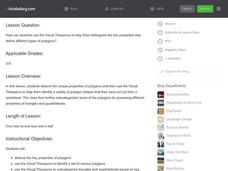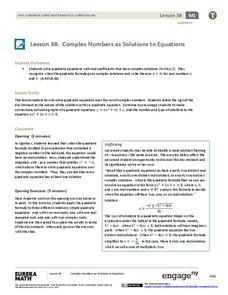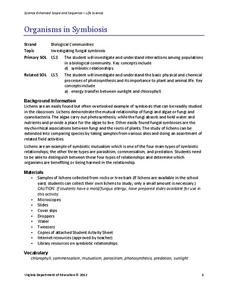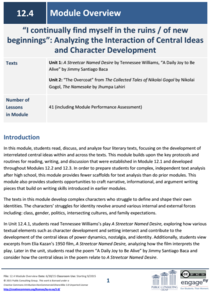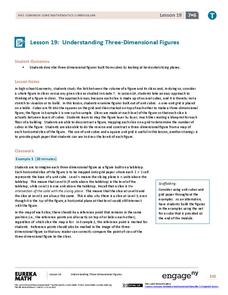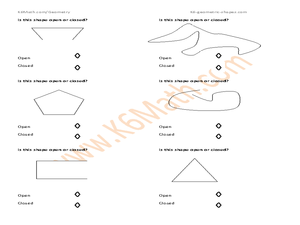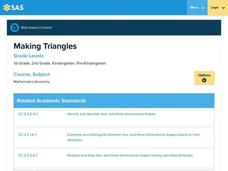Curated OER
Sorting Candy
Lower graders sort and group objects by their different properties. They watch a video about sorting then, sort and organize candy in different groups. Students compare how others sorted their candy. Finally, they decide which group has...
Curated OER
A Different Point of View
Elementary schoolers utilize a pattern worksheet embedded in this plan to work on a deeper understanding of geometric concepts like symmetry and congruency. Since geometry is such a visual form of mathematics, this lesson plan should fit...
Teacherfiles
Plot Graph
Any story can be mapped onto a plot graph. This particular chart includes the mountain shape of a traditional plot graph. Each element of plot is labeled on the page and surrounded by a box to make the words stand out. Learners write in...
EngageNY
Grade 10 ELA Module 1: Unit 2, Lesson 9
Do our childhood circumstances significantly shape us? As the close reading of “The Palace Thief” continues, groups examine how the results of the first "Mr. Julius Caesar" competition influenced the development of the characters in...
Curated OER
Dihedral Figures
Middle and high schoolers perform transformations. In this web based lesson, students explore dihedral figures. They use the web tools to translate, rotate, and reflect figures. Pupils identify lines of symmetry.
Minnesota Department of Natural Resoures
Getting to Know Trees
Celebrate the beauty of trees with a packet full of activities designed to help kindergarteners get to know about their leafy nature friends. Covering a variety of subjects, scholars go on a nature hike, read Shel Silverstein's The...
Curated OER
Pop-it...Stop-it
Students observe how certain geometric shapes can be used to make some structures rigid and others flexible. The activity involves construction of a 30-60 right triangle, folding while following directions, and identifying polygons.
Curated OER
Know Your Polygons!
Students identify and categorize different polygons. In this polygons lesson plan, students research and identify properties of polygons, identify different polygon shapes, and categorize different triangles and quadrilaterals.
EngageNY
Complex Numbers as Solutions to Equations
Quadratic solutions come in all shapes and sizes, so help your classes find the right one! Learners use the quadratic formula to find solutions for quadratic equations. Solutions vary from one, two, and complex.
Virginia Department of Education
Organisms in Symbiosis
Searching for an activity that allows emerging biologists to explore symbiosis up close and personal? Pupils collect samples and view lichens through a microscope and conclude with a discussion about the relationship they have...
Concord Consortium
Factors Affecting London Dispersion Attractions
How can non-polar molecules be attracted to one another? Introduce the phenomenon of London dispersion forces to young chemists through an entertaining interactive. Pupils choose from a variety of molecular shape combinations, then pull...
EngageNY
Analyzing Powerful Language: Learning to Read
The power of a word. Readers learn the importance of word choice in shaping a text by using a Powerful Language T-chart to separate strong words and phrases from those that are more bland. They then complete a third read and question set...
EngageNY
Grade 12 ELA Module 4: Literary Analysis
Does identity come from within, or do external forces shape it? Explore the complex identity concept with a two-unit module for 12th-grade language arts. The first unit uses A Streetcar Named Desire by Tennessee Williams and "A Daily Joy...
EngageNY
Understanding Three-Dimensional Figures
You can't judge a book by its cover ... or a cube structure by just one face. A creative activity looks at the shape of several cube structures described by level slices. The 20th activity of the 29-part series expects young...
CK-12 Foundation
Mineral Formation: Evaporating Lake
Get crazy for crystals! Junior geologists learn the secrets of crystal formation through lecture, reading, and examples. Other topics include common ionic compounds found in fresh and salt water, the effects of location on forming...
Curated OER
Shapes: Open or Closed?
In this shapes worksheet, students check either "open" or "closed" to describe given shapes. A reference web site is given for additional activities.
Curated OER
Images-Open or Closed?
In this open or closed image worksheet, students determine if a given image is open or closed, checking the appropriate box beneath each. A reference web site is given for additional activities.
Curated OER
Introducing Polygons
In this polygons instructional activity, students name the 6 different colored shapes, choose any 3 polygons to draw and color on a grid, while adding a right angled triangle and a rhombus.
Curated OER
Recognize Triangles
In this shapes worksheet, learners are asked to "colour" all of the triangles they find on the page. There are 10 shapes on the page and 4 are triangles. The second page contains suggestions for teachers on activities with 2-D shapes.
Curated OER
Playing With the Grid
Students examine works of grid art by the painter Chuck Close. They discuss the process of creating a drawing using a grid, view images of grid art, and create a grid drawing.
Curated OER
Identifying Patterns
Students investigate the elements of a pattern. In this geometry lesson, students identify different shapes in a pattern and discover which shapes are missing in order to extend it. Students create their own patterns using...
Pennsylvania Department of Education
Making Triangles
Students use interactive geoboards to identify simple geometric shapes. In this making triangles lesson, students describe the properties associated with geometric shapes. Students develop spatial sense and the mathematical meaning...
Pennsylvania Department of Education
Geoboards
Students describe shapes to their classmates using specific properties and practice making triangles on geoboards. In this geoboards lesson plan, students use string on the geoboards.
Curated OER
Draw It!
Students follow directions to make two- and three-dimensional shapes. Focusing on polygons, they use the shapes to solve real-world problems and review with the class. They read two of Shel Silverstein's poems and discuss the...







